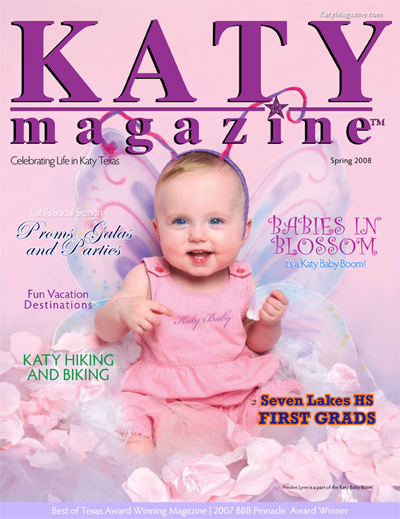
You'd be hard pressed to find an Asian family or face on the cover of any of the several Katy magazines mailed to our home each month
It was then that I first realized I was really different. I was asked where I was from, and I didn't know how to respond. America. I mean, I spoke English, didn't I? Then they'd specify: "'Where are your parents from?' 'What does it matter?'"(Ramirez, 842) was my exact response. At first I gave the students the benefit of the doubt- I didn't talk much, and I was new to school. After a year, I was hit by the truth. No one would ever look at me and think "American." I was "Asian-American." And what the hell did that mean?! Did it mean I was another color? Did it mean I was different, somehow less able? If anything, I was more able than most of my peers. Since I was very good at English, much like Melendez, "I knew I would be the one handling all the financial, academic, and commuting arrangements"(Melendez, 853-854) I required. I'd always taken care of myself and do my best to understand a system I had no guidance in. My first reaction was denial. I was just like everyone else. I slowly assimilated into American culture and became "white washed". I'd always been American, since I'd come here when I was 2 years old, but school uniforms and a carefree childhood had kept me from ever caring about style, movies, or my appearance. All of a sudden, I was challenged. I had to fit in. My parents didn't grow up listening to 80s songs, so when they played them at school, I'd feel left out. I'd go home and do my research. No matter what, I was always Asian-American, and never just American.

I felt as misplaced as this woman looks while I strove to assimilate. I would often be teased for "having a dot on my head" (and by the way, I've never put one on, I'm not even Hindu). I was just the opposite of her- a brown girl with a punk-rock haircut and preppy clothes.
"I don't feel like a Dartmouth student, but rather a Latino Dartmouth student"(Ramirez, 838) Ramirez lamented. I completely understand the feeling. Even after coming to terms with your ethnicity, the fact remains a nuisance. I used to get embarrassed because my culture and my parents didn't allow me to wear the clothes the other girls wore or go out the way they did. I tried to hide it, and although I felt restricted, "I never once damned my parents, nor my Koreanness"(Lee, 879) (Indo-Pakness in my case), because it was still a large part of who I was. It's a strange conflict. To feel obligated to two worlds and unable to really dislike one or the other.
Eventually, I realized this was all foolishness. If anything, I'd become fiercely proud of the fact that my parents were immigrants. Immigrants are in my opinion, some of the most hardworking, respectable, and intelligent American citizens. When my parents went to take their Naturalization oaths, I was surprised to look over the tests they had to take for citizenship.

There are so many stories in a room full of immigrants giving their naturalization oaths. I wish I could interview every one of them.
Half of my junior class couldn't even pass the tests they got 90% or above on. Standing in a room of people giving oaths is amazing. You can smell passion. It's invigorating. Remarkable immigrant stories are everywhere- my friend's mother used to walk a mile to school everyday in the heat of summer. Melendez's brother was amazing. "At nineteen, he tackled the English language, his first year of college, a job, and the army. After five years... he graduated with honors"(Melendez, 852). I know a young boy who is a freshman with me here at UT. He came to America at the age of 15, not speaking a lick of English. He graduated at 18 as Valedictorian of his class. His English is impeccable and almost as amazing as his work ethic. At times, I wish I hadn't grown up here. I wish I knew what it was like to want something so bad that I wouldn't settle even for an A minus. Don't get me wrong, everything I do is for my parents. It seems "no matter how successful I am, it will never make up for the fact that my parents put themselves, their personal dreams and goals aside so I could succeed"(Ramirez, 843). My parents had great lives in Asia. They had successful careers, plenty of land, fame, fortune, and whatever else you could hope for. They gave it all up to come to America and work ridiculously hard just to give us the opportunity to go to school. My mother has her Master's, and my father finished Law School as Valedictorian, but neither knew the process to get their degrees recognized in America. Working hard, they programmed us from childhood, saying "your father and I weren't able to go to college, but you will"(Ramirez, 838). I watched the pain in my parents eyes as my brother consistently failed in school. His failure encouraged me, and I got straight A's. I conquered all that I could, simply so that my parents would be proud. Somewhere since then and now, I lost that fire. I'm ashamed.
Being a second-generation Asian-American, I'm not sure how I feel about third-generation/white washed Asian-Americans. I pity those who didn't learn their native tongue and grow up in a traditional, non-American environment. I feel as if they're deprived and they'll never know what they're missing. Lee's parents were not understanding. In response to his gayness, his father encouraged him to "Get the AIDS... You are no longer my son. You shame us"(Lee, 878). The pain of these words cannot be expressed in words. When you care so deeply about your parents and work hard for them only to be dismissed, there is no consolation. Contrastingly, Ng's "body was gripped by anger as tears started to come to [his] eyes... [his father] was one who made it through growing up in a physically abusive family environment"(Ng, 881). While I don't despise Ng for not growing up in an abusive environment, I do not respect him for the way he speaks to his parents. "Would you put down the dishes and just fucking listen to me!!!"(Ng, 880) introduced him in this paper.

I find disrespecting elders, especially your parents, to be disgusting.
For some reason, I wouldn't be so offended had a Caucasian person written this paper, but perhaps that just goes to show that we ourselves discriminate to. Or perhaps it's just that we hold other Asian-Americans to higher standards because our families tend to be more traditional and not yet lost in the melting pot. Lee lived the horror stories that Ng could probably only imagine. "After his [father's] fifth attempt in one week to "beat the gay out of [Lee]"... mother tried to protect [him]... and ended up getting herself battered... [he] punched [his father] square in the chin"(Lee, 878). Having to watch your mother get hurt and then having to hurt your father can be a very difficult experience. When I was younger, my father used to become furious with my brother's inability to do well in school. He'd beat him, and my mother would often try to protect him. Although my father never hurt my mother, he had no mercy with my brother. The episodes eventually ended, but the fright of having to experience anything like that still makes my heartbeat skyrocket. Words don't do the situation justice.
All in all, despite the difficulties, we are all very lucky to be in America legally. Many immigrants have much greater concerns than we do. We simply have to adjust. Ramirez was furious that his family was asked for papers until his mother pointed out that "When they asked for... papers, [she] saw some people rush to the bathroom"(Ramirez, 841). Gratefulness is a crash course I know I could take, and perhaps everyone in the United States as well. Immigrants and non, we have no idea how blessed by opportunity we truly are.






































